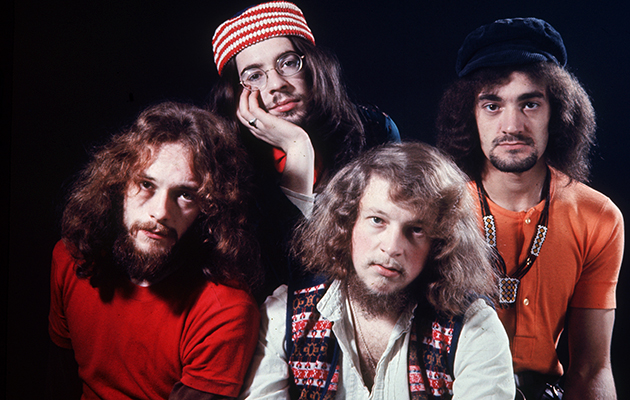ANDERSON: There was a Nice song called “Diamond Hard Blue Apples Of The Moon”, which had this wonderful rhythmic feel that I really liked. I remember saying to Clive, “Try something like Blinky Davison played.” It was difficult writing music – impossible, towards the end of 1968 – that was in Mick Abrahams’ comfort zone. The more I felt I was progressing as a musician, as a songwriter, the further I seemed to be stretching Mick’s potential, because he was very much a died-in-the-wool British R&B blues player. But luckily, “A Song For Jeffrey” just about came into his comfort zone.
ELLIS: We chose Sound Techniques because it was cheap. This was the very early days of independent recording companies or even groups recording themselves.
ANDERSON: Sound Techniques was best known for recording folk music, but we went there because it was the cheapest place Terry and Chris [Wright, Ellis’ business partner] could find. It was a four-track, and luckily of course the tapes they were using then were industrial so the oxide is still on them to this day.
ELLIS: I booked a four-hour session, which was all we could really afford. They had this funny engineer called Victor Gamm – he got the band’s humour, so he made us feel very comfortable. In that first four-hour session we did three tracks – recorded, overdubbed and mixed.
BUNKER: We would be working live virtually every night of the week – I remember one time having a three-day holiday, it was amazing!
ELLIS: I took the first recordings back to Chris Wright and said, “Do you think I should finish the record?” He said, “Yeah, there’s just one problem, we don’t have any money.” I had a company bank account with the National Provincial Bank in Welwyn Garden City, where I was brought up. So I got in my little Mini and visited the bank manager, took him a bottle of Scotch, and persuaded him to lend us the money. Which he absolutely shouldn’t have done – that’s not what country bank managers do, they don’t lend little rock’n’roll agencies money to make risky records. But it paid off for him – we kept our account with him for many years.
ANDERSON: Terry was very much part of Jethro Tull’s success, but we began to clash. Musically he had no ideas at all, but he was behind the funding of the first album, so that earned him the right of being our producer. But of course ‘producer’ in movie terms, rather than a producer like George Martin. But I still have healthy regard for Terry and his diligence and his enthusiasm and his growing business acumen. Of course, by the time “Jeffrey” came out as a single, Mick [had left].
ELLIS: They were on the road in a van all the time, so that difference between Mick and Ian made that travel difficult. I think Mick just saw the way the music was going, and just didn’t like it.
BUNKER: Mick was blues, full stop. He doesn’t listen to anything else! It’s not like Mick was gonna progress anywhere. He was being a bit of an idiot, to be quite honest – acting up in the studio, like facing the wall when he was recording. I remember we were in Watford Gap on the way back from a gig, and Ian and Glenn said to me, “Look, we’re thinking of asking Mick to leave. What do you think about it?” And I said, “He’s being a prat, he should go.” He didn’t wanna be in the band, but he didn’t wanna leave the band. He didn’t wanna do what we all wanted to do, which was to progress further.
ANDERSON: It fell to an embarrassed and slightly reluctant Tony Iommi to mime the guitar part when we did The Rolling Stones’ Rock And Roll Circus, at the cusp of the new year [December 1968]. Tony’s got a hat pulled down his face lest anybody, particularly the other members of the soon-to-be Black Sabbath, realised their guitar player was still cohorting with another band here and there! That was the one and only meaningful performance of “A Song For Jeffrey”.



